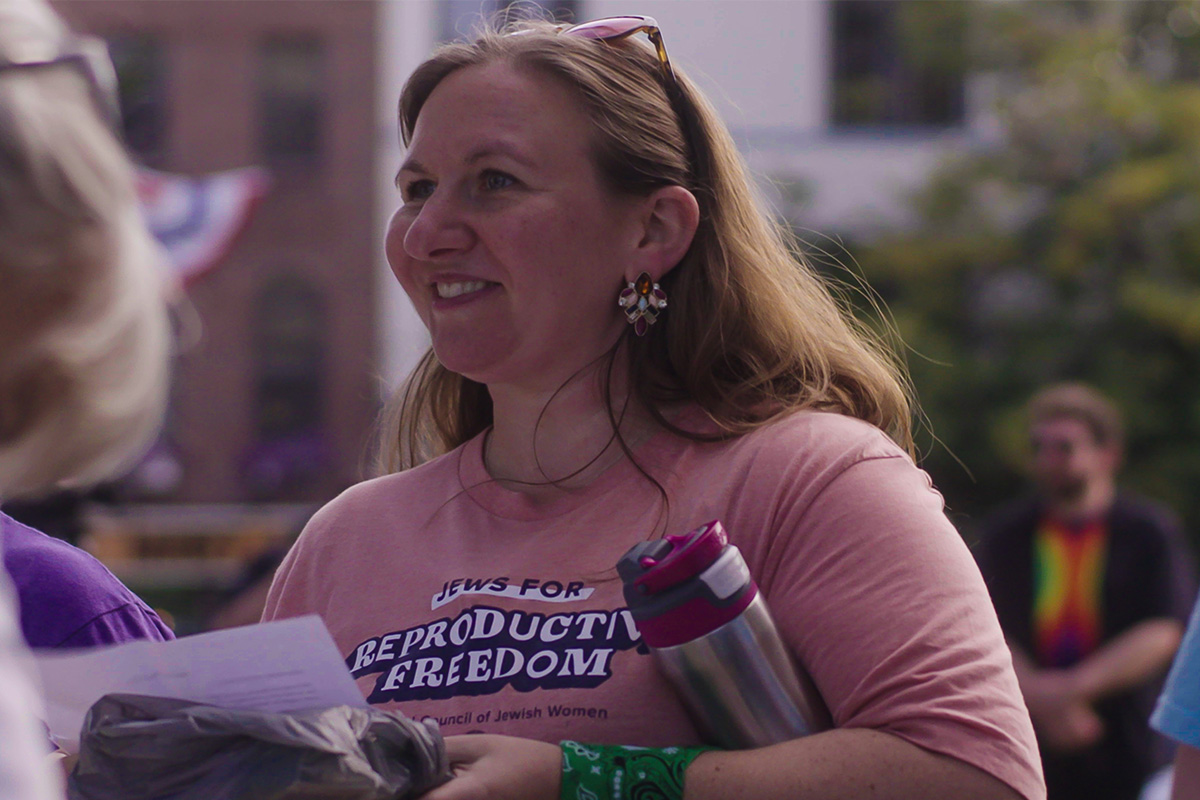On the night before Indiana’s near-total abortion ban was set to take effect, Jewish activist and mother Elly Cohen, along with her group Jewish Hoosiers for Choice and others in support of reproductive freedom, rallied outside of the Indiana State Capitol.
“In the Jewish tradition, we conduct a ritual called havdalah,” Elly addressed the crowd. “Havdalah is a ceremony that separates between the holy day of Shabbat and the everyday. It separates between rest and work, between lightness and darkness. And so on this evening, we would like to mark this separation between having abortion rights and not having abortion rights with a modified havdalah ritual.”
After completing havdalah, which included extinguishing a multiwick candle with water instead of wine, Elly continued, “As we mark this separation and acknowledge our pain, we must also think about the responsibilities that we carry forward, our obligations to show up for those most impacted by this decision. There is work to be done, and I know all of us here will continue to do that work.”
New short film “Under G-d” does exactly that, documenting the Jews leading interfaith efforts to protect reproductive freedom in America’s post-Roe political landscape.
The documentary from Modern Orthodox filmmaker Paula Eiselt, which premiered at Sundance Film Festival earlier this year and is now streaming via PBS, follows Elly, Rabbi Barry Silver, Rachel K. Laser (Jewish leader of Americans United for Separation of Church and State) and others as they fight abortion bans in courts across the country. Their argument? These abortion bans are rooted in Christian theology, not only violating their constitutional rights as Jews whose religious laws allow for abortion (and prioritize the wellbeing of the pregnant person over the fetus), but also violating the Religious Freedom Restoration Acts (RFRAs) in the 23 states which have them. Historically, RFRAs have been used by conservative Christian organizations who are anti-choice and anti-LGBTQ+. However, these Jews are now turning the tables.
“The test is this: Are you going to use RFRA only to protect fundamentalist Christians and their intolerance, or do Jews get to use it too?” Rabbi Silver asks in the movie.
For his part, Rabbi Silver and his Florida synagogue, Congregation L’Dor Va-Dor of Boynton Beach, were among the first to sue a state-level abortion ban when the Supreme Court’s Dobbs decision overturned Roe v. Wade last summer. Now, Congregation L’Dor Va-Dor has been joined by Florida-based clerics representing Christianity, Unitarian Universalism and Buddhism in four other lawsuits, claiming that the abortion ban violates their religious freedom as well.
A few months later, Elly Cohen and Jewish Hoosiers for Choice sued the state of Indiana’s near-total abortion ban. (In the documentary, Elly explains that her Jewish values not only compel her to fight for reproductive justice, they also informed her difficult decision to terminate a pregnancy with a fetus that was “incompatible with life.”) Their lawsuit won on December 2, 2022, successfully blocking it. (Last month, the Indiana Supreme Court upheld the abortion ban on grounds that it doesn’t violate privacy laws, however the court has not heard Jewish Hoosiers for Choice’s case and it’s not immediately clear when the ban will go into effect.) In January, Laser’s Americans United for Separation of Church and State joined five rabbis and multiple other faith leaders as they challenge Missouri’s abortion ban. And, though not covered in the documentary, three Jewish Kentuckians have also filed a lawsuit against their state’s abortion ban.
“As a Jewish woman, a Jewish mother, to see that there are Jews, rabbis, organizations, standing up to these bans, to the Dobbs decision, and finding ways to flip the script on many of these laws was very inspiring,” Eiselt told the Jewish Telegraphic Agency in January.
She later added, “The fact that Jews were leading this tactic and this battle, really no other group was thinking about it this way. But as Jews, we know what it’s like when there is no separation between church and state, and this is the prime example of that.”
For Jewish viewers, “Under G-d” serves as a particularly important reminder that the Dobbs decision is the beginning, not the end, of the fight for reproductive justice and religious freedom in the United States. The film is the seemingly perfect embodiment of the line in Pirkei Avot: “It is not your duty to finish the work, but neither are you at liberty to neglect it.”



